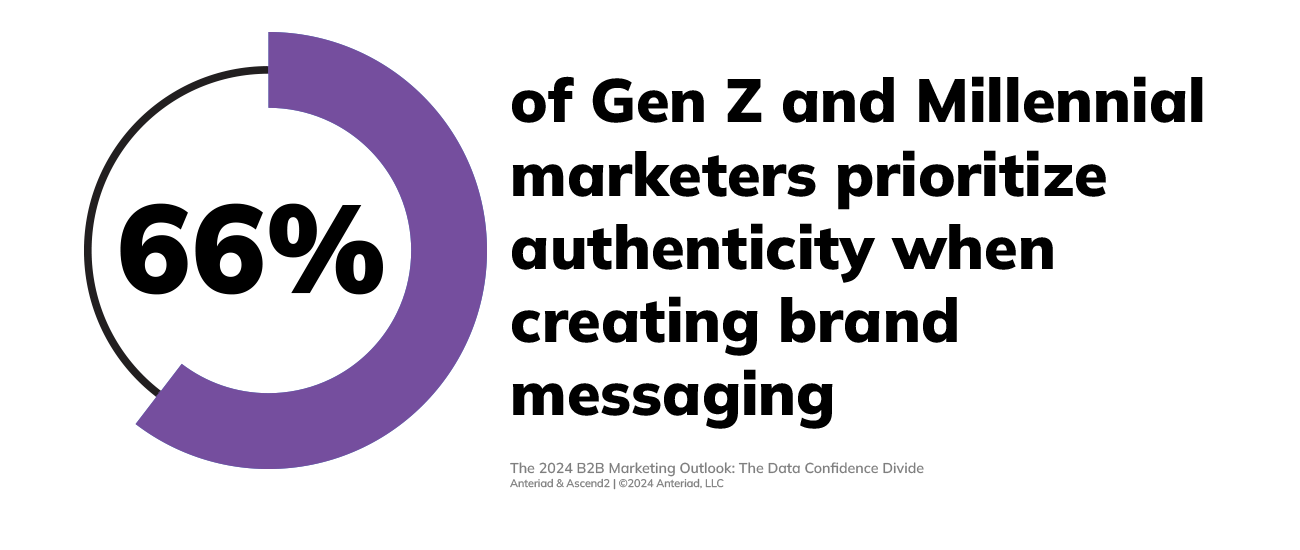Inside the success of Gen Z and Millennial B2B marketers
Younger business buyers behave differently than their older counterparts, which means new marketing strategies and tactics are a must. This report reveals how younger B2B marketers are succeeding in this new landscape.
Professionals born 1981 - 2012 make up 71% of business buyers according to Forrester. Forrester finds that these Gen Z and Millennials are growing in influence and approach buying differently than Gen X and Boomers. Younger buyers care less about revenue and more about other dimensions of value. This digitally-native group wants frictionless experiences online and off. And, they tend to be much more interested in collaboration and participatory buying experiences than a top-down process.
These unique attributes are changing the way B2B marketers need to approach younger buyers.
So, we asked the question...
How are Gen Z and Millennial B2B marketers different from their older counterparts, and are they succeeding in reaching their peers?

The strategy seems to be working
Quicker to identify changing buyer behaviors
Younger marketers are much more attuned to change in their buyers’ behaviors. Gen Zers and Millennials are much more likely to report that they see an increase in the use of social media, online research and the need for peer reviews. They also are more likely to note an increase in price sensitivity, length of purchase process and the number of people in a buying group.
An important positive of younger marketers is their ability to read buyer signals -- either because they have better data, are more focused on buyers, or both. These are all well-reported shifts in buyer behavior that younger generations are identifying more often than other marketers, giving them a competitive advantage if they adapt their marketing strategies to these behaviors.

Infographic: Gen Z and Millennial marketing magic
Explore these interesting findings and more from our research data in the infographic.
Testing new tactics while building a strong foundation
Gen Zers and Millennials balance adapting to new buyer behavior with building the foundations of marketing like quality data and integrated technology. They are actually more likely than older marketers to identify and tackle challenges to build a high-functioning marketing machine. While all generations ranked “improving data quality” as their top priority, Gen Zers and Millennials were most adamant about getting this core element of B2B marketing right.
It also seems that younger marketers have more confidence in their ability to solve for data quality. While older generations selected “improving data quality” as their top challenge, Gen Z and Millennial marketers listed other challenges above or equal to it, including integrating technology and testing and implementing new tactics.

Speaking of implementing new tactics, younger generations use a different mix of tactics, including influencer marketing, video, and interestingly, paid email. Gen X mixes newer and traditional strategies, particularly leading in search engine marketing and social advertising. Boomers favor established channels like account-based marketing and paid search.
Boomers, who prioritize sourcing the right data (58%) and data integration (53%), also favor fewer channels. The other age groups are using 2-5 channels to reach audiences in typical marketing campaigns, with Gen X leading in the use of 6+ channels.
Younger generations’ use of new tactics:
- Video marketing: Gen Z and Millennials dominate at 62%, followed by Gen X at 50%, and Boomers at 37%.
- Influencer marketing: Prevalent among Gen Z and Millennials at 53%, less so among Gen X (40%) and Boomers (34%).
- Paid email: Gen Z and Millennials at 42%, Gen X at 35% and Boomers at 34%.
This could be from a willingness to test new things and lean into the tactics that yield the best results, rather than stick to what they know best or have a bias against tactics that might be worth revisiting in a new light (like paid email).
Optimism in the age of AI
When it comes to B2B marketing, youthful optimism reigns. We found that 47% of Gen Z and Millennial marketers expect a significant revenue increase in 2024, compared to 27% of Gen X and only 5% of Boomer marketers. More Gen Z and Millennial marketers also expect larger increases in marketing budget, team size and lead pipeline than their counterparts.
Forrester notes that building trust should be the top focus on B2B marketers, as it is a critical factor in both purchase decision making and client loyalty. To build trust, marketers need an approach that builds confidence for a distrustful buyer, and that requires consistency and authenticity.
Not only do 66% of Gen Z and Millennial marketers prioritize authenticity when creating brand messaging (not actually as high as Gen X at 68%), they are much more likely to be optimistic that they can achieve a balance of authenticity and AI. Younger generations are also much more likely to believe that AI will have a positive impact on key marketing factors including consistency and authenticity.

Adding buyer insights and new tactics to the marketing strategy
Younger marketers are tuned into their buyers’ needs and make the changes necessary to reach them effectively, creating a positive feedback loop of continuous improvement. Any marketer can learn from this approach and learn more about their own audiences through data and research, social media, industry events, peer exchanges, and sales conversations.
With those inputs in place, marketers can start to test for the right mix of channel, data and messaging for their audience.
This positive feedback loop of customer insights and testing tactics is likely why Gen Zers and Millennials are the most confident among all generations at the strategic and tactical levels. Not only do they expect company and budget growth this year, but Gen Zers and Millennials are more likely to be extremely confident in things like ABM success, targeting the right personas, and ICP compared to their older counterparts.
While seasoned marketers bring a depth of understanding of their business, marketing best practices, and more, younger marketers show that learning more about buyer behavior and testing new tactics is a valuable addition to the marketing plan.
Infographic: Gen Z and Millennial marketing magic
Explore interesting findings from our research data on how marketers differ by age, and how these marketers are making marketing magic.
The 2024 B2B Marketing Outlook: The Data Confidence Divide
Discover how your peers approach data strategy, authenticity, AI, and audience evolution in the 2024 B2B Marketing Outlook Report.
